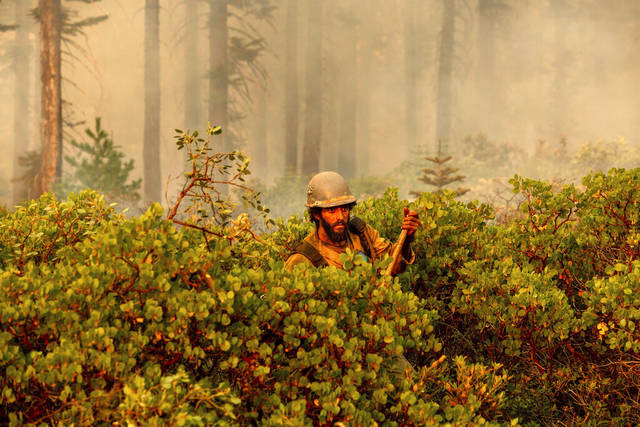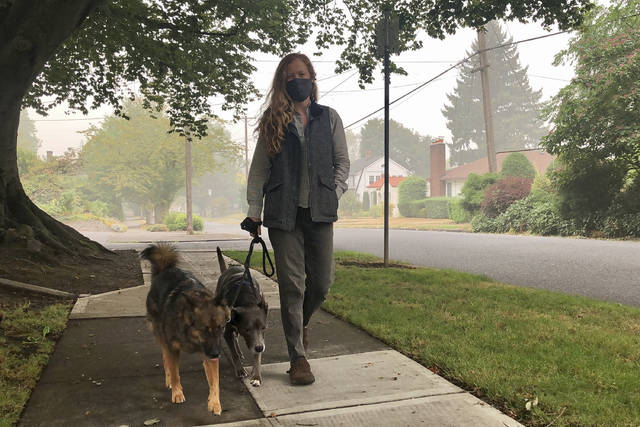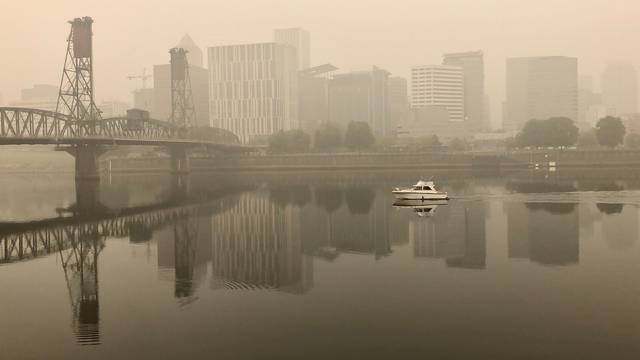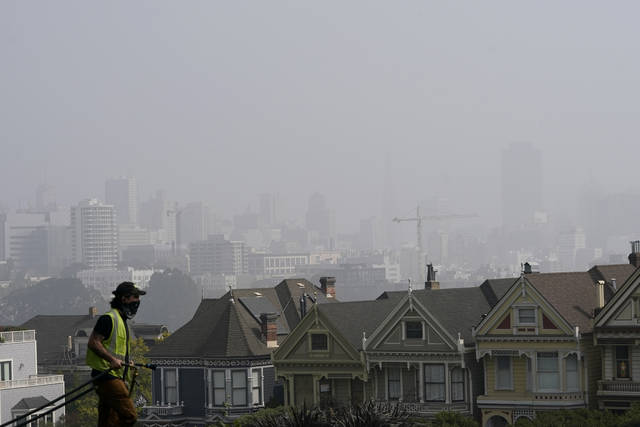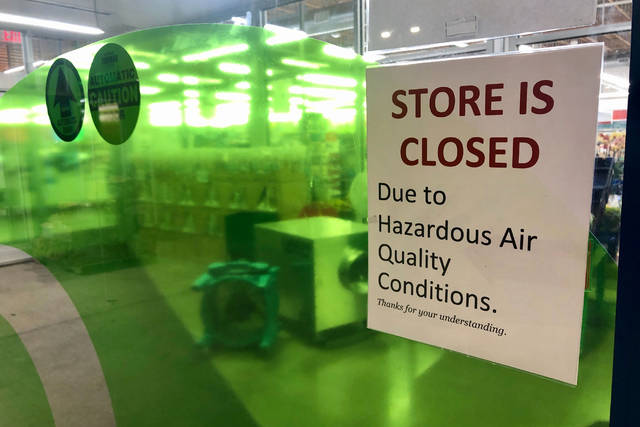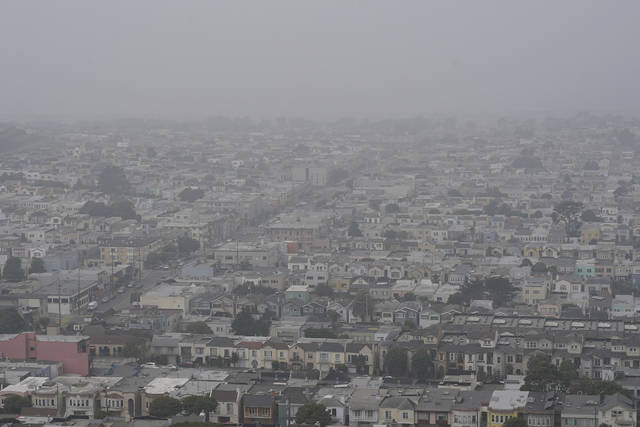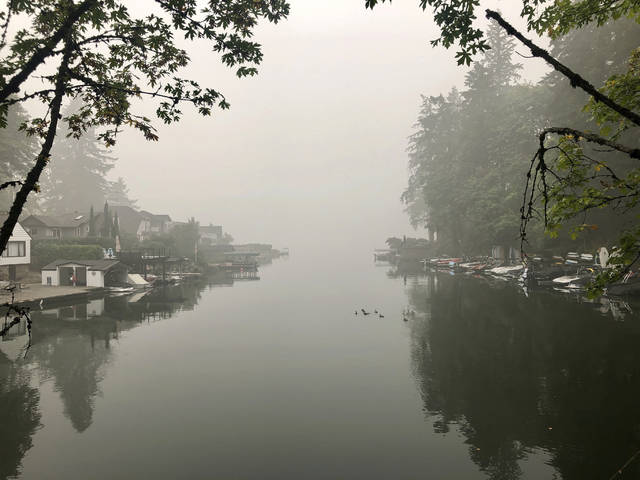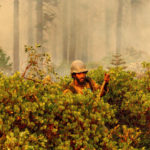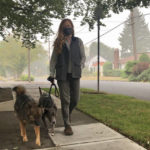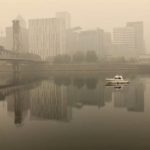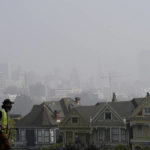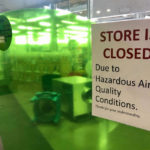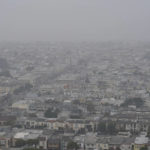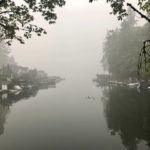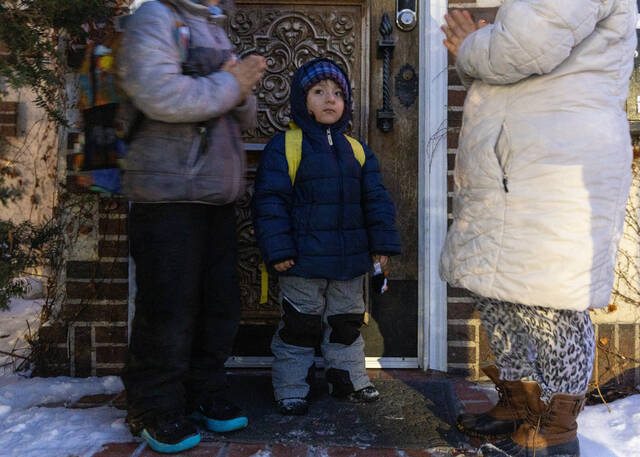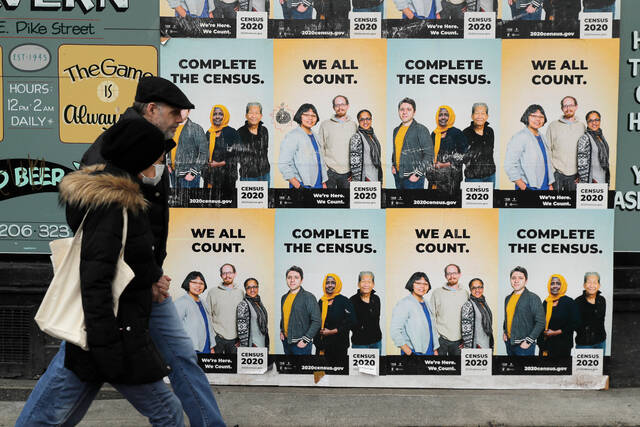PORTLAND, Ore. — Putrid, dangerous air spewing from massive wildfires on the West Coast is seeping into homes and businesses, sneaking into cars through air conditioning vents and keeping people already shut away by the coronavirus pandemic from enjoying even a walk outside or trip to the park.
People in Oregon, Washington state and California have been struggling for a week or longer under some of the most unhealthy air on the planet. Relief from the acrid yellowish-green smog may not come for days or weeks, scientists and forecasters said.
And with wildfires getting larger and more destructive because of climate change and more people living closer to areas that burn, it’s likely smoke will shroud the sky more often in the future.
“I don’t think that we should be outside, but at the same time, we’ve been cooped up in the house already for months, so it’s kind of hard to dictate what’s good and what’s bad. I mean, we shouldn’t be outside period,” Portland resident Issa Ubidia-Luckett said as she grabbed food Monday.
The hazy, gunk-filled air closed businesses such as Whole Foods stores and iconic Powell’s Books in Portland and suspended garbage pickup in some communities. Pollution and fire evacuations canceled online school and closed some college campuses in Oregon.
Smoke enveloped Washington state, and some parts of California might not see relief until next month. Oregon’s Department of Environmental Quality extended an air quality alert to Thursday, and the air was so thick that Alaska Airlines stopped flights to Portland and Spokane, Washington, until Tuesday afternoon.
Zoe Flanagan, who has lived in Portland for 12 years, braved the smog to walk her two dogs Monday. In desperation, Flanagan and her husband turned on the heater a day earlier because it has a better filter than their air conditioner.
“I can feel it in my chest and then I just feel hungover despite not drinking,” she said. “I felt really hungover all day Saturday. I just couldn’t get enough water, I had a headache.”
Health officials urged people to stay inside and keep windows and doors closed. Smoke can irritate the eyes and lungs and worsen some medical conditions. Health experts warn that young children, adults over 65, pregnant women and people with heart disease, asthma or other respiratory conditions should especially avoid smoky areas.
Wildfire smoke from western U.S. has spread to Washington, D.C. https://t.co/jf5fZNttgy
— CBS News (@CBSNews) September 15, 2020
Smoke from dozens of Western wildfires is pooling in California’s Central Valley, an agricultural region that has some of the state’s worst air quality even when there are no flames. Some parts of central California are not likely to see relief until October, said Dan Borsum, the incident meteorologist for a fire in Northern California.
“It’s going to take a substantially strong weather pattern to move all the smoke,” Borsum said at a briefing Sunday.
Joe Smith, advocacy director for Sacramento Loaves & Fishes, which helps homeless people, said California’s capital city hasn’t seen consistent blue skies in weeks. People without homes have been grappling with an onslaught of disasters this year.
“Some of the toughest folks you’ll ever meet are people who live outdoors, unhoused, but it is getting to them,” Smith said. “We’ve got covid-19, followed by excessive heat wave, followed by smoke. What’s going to start falling out of the air next on these poor folks?”
Twana James, who lives in a tent in Sacramento, coughed several times, trying to clear her throat, saying her voice is not usually so hoarse.
“We got hella ashes from the fires, everything is covered in ashes,” she said by phone Monday. “It’s hard to breathe.”
Places like the Oregon Convention Center in downtown Portland are being used as shelters for people who need a dose of healthy air. Typically during wildfires, people can escape to other areas of the state to breathe easy, said Dylan Darling, a spokesman for the Oregon Department of Environmental Quality.
“That’s what’s standing out — there just isn’t a place in Oregon right now to find fresh air,” Darling said. The level of pollution lingering for so long and so widely “really stands out in the state’s history,” he said.
Oregon needs a “perfect balance” of winds to disperse smoke but not exacerbate the fires, said Tyler Kranz, a meteorologist at the National Weather Service’s Portland office.
“We need the winds to get the smoke out of here,” Kranz said. “We just don’t want them to be too strong, because then they could fan those flames, and all of a sudden, those fires are spreading again.”
Ubidia-Luckett was eating outside Monday at a popular burger place east of Portland with her 6-year-old son, but they moved inside because of the bad air, which had postponed the boy’s first day of kindergarten for the second time.
“That’s the hard part for little kids. They’re so cooped up so what do you do?” she asked. “Eventually, they want to go outside.”


